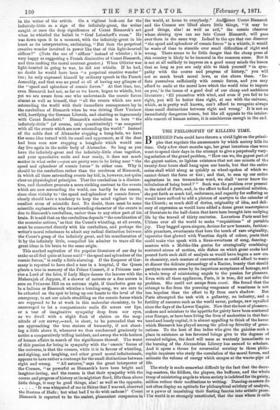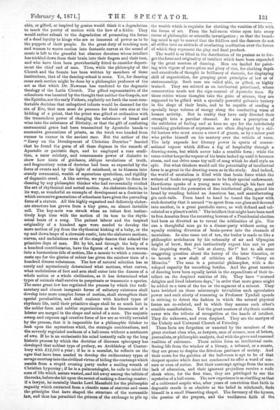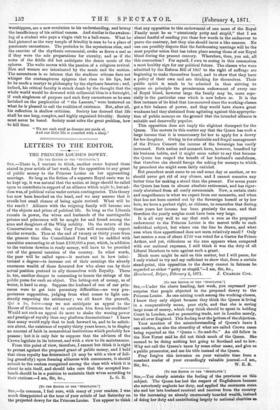THE PHILOSOPHY OF KILLING TIME.
BESIEGED Paris could have thrown a vivid light on the princi- ples that regulate the amusements by which society kills its time. Only a few short months ago, her great luxurious class were wont to spend their days in the attempt to give a perpetually vary- ing solution of the grand problem, " How can we, the gayest part of the gayest nation, so lighten existence that not one minute of the twenty-four hours shall hang upon our hands, but that the entire series shall whirl along as quickly as wheel-spokes of which we cannot detect the form or tint ; and that, to sum up our entire aspirations in one tremendous word, we shall ' never know the tribulation of being bored ?' " Such was the problem ever present to the mind of Paris, and, in the effort to find a practical solution, she put forth as much toil, endurance, and capacity for suffering as would have sufficed to add a platoon of martyrs to the calendar of the Church ; as much skill of device, originality of idea, and deli- cacy of expression as would have added a dozen great masterpieces of literature to the half-dozen that have been brought into undying life by the travail of thirty centuries. Luxurious Paris sent her Uhlans over all the world to make " requisitions " of portable joy. They bagged opera singers, devices for new bonnets, fashion- able preachers, sweetmeats that bore the touch of rare originality, tapestries that glowed with Venetian depth of colour, poets that could make vice speak with a Siren-sweetness of song, dancing- masters with a Moltke-like genius for strategically combining scattered atoms of motion, side dishes on which great cooks had poured forth such skill of analysis as would have begun a new era in chemistry, such masters of conversation as could afford to waste at dinner the delicate phraseology of a Racine, beauty that should paralyze common sense by its imperious acceptance of homage, and a whole troop of ministering angels to the passion for pleasure. Even with all these appliances, Paris, it is true, did not solve the problem. She could not escape from ennui. She found that the attempt to flee from the pursuing vengeance of weariness is not less hopeless than the effort to fly from one's shadow. But Paris attempted the task with a gallantry, an industry, and a fertility of resource such as the world never, perhaps, saw equalled since the days of the Lower Empire. Now that the host of pleasure- seekers and ministers to the appetite for gaiety have been scattered over Europe, or have been living the lives of anchorites in that bat- tered and lonely capital, it is almost appalling to think of the havoc which Bismarck has played among the piled-up frivolity of gene- rations. To the host of fine ladies who give the gaieties such a place in existence as less favoured beings give to the dogmas of revealed religion, the deed will seem as wantonly iconoclastic as the burning of the Alexandrian Library has seemed to scholars. And it opens a theme for reverential scrutiny to those philo- sophic inquirers who study the correlation of the moral forces, and estimate the volume of energy which escapes at the waste-pipe of life.
The study is made somewhat difficult by the fact that the danc- ing-masters, the fiddlers, the players, the buffoons, and the whole troop of ministering angels to whom society is indebted for its gaiety, seldom reduce their meditations to writing. Dancing-masters do not often display an aptitude for philosophical subtlety of analysis, or a power of translating their fleeting fancies into artistic prose. The world is so strangely constituted, that the man whom it calls able, or gifted, or inspired by genius would think it a degradation to teach the poetry of motion with the bow of a fiddle. They would rather submit to the degradation of presenting the forms of a dead loyalty to kings who are so innocent of power as to be the puppets of their people. So the great duty of teaching men -and women to weave motion into fantastic curves at the sound of music is left to the graceful but obscure devotees whose intellect has trickled down from their brain into their fingers and their toes, and who have thus been providentially fitted to consider deport- ment the chief end of man. Thus, while the philosophy of the Church and the Senate has been written by members of these institutions, that of the dancing-school is mute. Yet, for dancing some such service might be done by a philosophic professor of the art as that which Dr. Newman has rendered to the dogmatic theology of the Latin Church. The gifted representative of the -schoohnen was haunted by the thought that neither the Gospels, nor the Epistles, nor the early Fathers, explicitly set forth the most com- fortable doctrine that unbaptized infants would be damned for the -sin of Eve, that men must do penance for their own sins at the bidding of a priest, that the priest was gifted at ordination with the tremendous power of changing the substance of bread and wine into the substance of Divinity, or that the gift of conferring sacramental grace had been transmitted by Apostolic hands to successive generations of priests, as the torch was handed from runner to runner in the ancient race. But the author of the -" Essay on the Development of Christian Doctrine " fancied that he found the germ of all these dogmas in the records of Apostolic or patristic days, and he employed a rare erudi- tion, a rarer subtlety, and consummate power of dialectic to :show how hints of guidance, oblique revelations of truth, and fragmentary notes of doctrine had been so expanded by the force of events and by the light of sainthood, as to blossom into -stately ceremonial, wealth of mysterious symbolism, and rigidity of dogmatic creed. A like service, we repeat, might be done for dancing by any philosophic thinker who had reverentially studied the art of rhythmical and netted motion. An elaborate dance is, in its way, as wonderful an example of development as a doctrine to which successive generations of schoolmen have given the pervading force of a statute. All this highly organized and delicately elabor- ate structure has grown from a tiny germ, an almost invisible cell. The key-note was struck when an infant first instinc- tively kept time with the motion of its toes to the rhyth- mical beats of a song. The patient labour and the inspired -originality of a hundred ages were needed to develop the mere motion of joy from the rhythmical kicking of a baby, or the up and down leaps of a clownish rustic, into the elaborate motions, -carves, and undulations even of the simple dances that solaced the primitive days of man. Bit by bit, and through the help of a a hundred contributaries, have the figures of a waltz been woven ;into a harmonious tide of motion, like a mosaic to which a consum- mate eye for the glories of colour has given the rainbow tints of a hundred diverse substances. The law of natural selection has as :surely and mysteriously determined what motions, what curves, what undulations of foot and arm shall enter into the dances of a 'whole nation or a whole civilization, as it has determined what types of animals shall survive to perpetuate or transmute a species. The same great law has regulated the process by which the rudi- mentary and almost inorganic forms of saltatory existence shall .develop into more complex forms of motion, shall strengthen their special peculiarities, and shall coalesce with kindred types of rhythmic life, until their primitive shape shall be as much lost in the nobler form and subtler organization as the lineaments of a lobster are merged in the shape and mind of a man. The majestic -sweep and expanse aild creative force of law are so vividly revealed by the process, that it is impossible for a philosophic thinker to look upon the mysterious whirl, the strategic combinations, and the severely regulated madness of a ball-room without a sentiment -of awe. If he is an ecclesiastic his mind instantly calls up the long historic process by which the doctrine of diocesan episcopacy has -developed that noblest type of prelacy, an Archbishop of Canter- bury with £12,000 a year ; if he is a moralist, he reflects on the ages that have been needed to develop the rudimentary types of savage courtesy into the civilized virtue of hiding the contempt which results from a stupid evening party under a smiling wreath of Christian hypocrisy ; if he is a palmoutologist, he calls to mind the -eons of life which nature wasted, and hid away among the tablets of the rocks, before she hit upon the secret of making a dancing-master; if a lawyer, he mentally thanks Lord Mansfield for the philosophic sagacity which extracted from a chaotic mass of statutes and cases the principles that have shaped the structure of the mercantile law, and thus has permitted the princes of the exchange to pile up the wealth which is requisite for clothing the vanities of life with the forms of art. From the ball-room vistas open into every recess of philosophic or scientific investigation ; so that the brood- ing mind is apt to marvel that the fiddlers and the dancers do-not all stiffen into an attitude of everlasting meditation over the forces of which they represent the play and final product.
The world is so blind in the distribution of its praises as to for- get the force and originality of intellect which have been expended by the great masters of dancing. Men are lauded for paint- ing with vigour of conception and glory of tint, for clothing depth and exactitude of thought in brilliancy of rhetoric, for displaying skill of organization, for grasping great principles of law or of statesmanship. Such men are called able, or gifted, or highly trained. They are saluted as an intellectual priesthood, whose consecration needs not the sign-manual of Apostolic time. By those critics whose thoughts take the guise of science, they are supposed to be gifted with a specially powerful galvanic battery in the shape of their brain, and to be capable of sending a specially large volume of energy along the conducting wires of human activity. But in reality they have only directed their strength into a peculiar channeL As nice a perception of the subtleties of feeling and as keen an eye for the indefinitely vanishing gradations of expression are often displayed by a skil- ful hostess who must amuse a crowd of guests, as by a minor poet who prides himself on his mastery over the vehicle of verse. The lady expends her literary power in spurts of conver- sational vapour which diffuse a fog of hospitality through a drawing-room, but which never take a sensible form ; while the verse-writer keeps the vapour of his brain locked up until it becomes steam, and can drive some toy mill of song which he shall style an epic. But what thinkers would call the potentiality of intellectual force is as great in the drawing-room as in the study. And indeed, the world of menialism is filled with that brain force which the writers of books arrogantly assume to be their special endowment. Hawthorne speaks of a young man who, although his face and head betokened the possession of fine intellectual gifts, gained his bread by standing behind an American bar, and manufacturing gin cock-tails. From hand to hand he tossed the liquor with such dexterity that it seemed "to spout from one glass and descend into another, in a great parabolic curve, as well defined and cal- culated as a planet's orbit." The intellect that might have been used to free America from the recurring horrors of a Presidential election had been so diverted as to reveal the sublimities of gin. Nor can a thoughtful man go to a dinner-party without seeing an equally striking diversion of brain-power into the channels of menialism. In nine cases out of ten, the butler is made so like a philosophic archdeacon by his solemnity of air and Olympian height of brow, that you instinctively expect him not .to put the inquiring words, " 'ock or sherry, Sir ?" but to ask some staggering question about the heresy of the later Gnostics, or to launch a new shaft of criticism at Hume's "Essay on Miracles." The man is a potential philosopher, with a de- veloped capacity for uncorking bottles. And the great masters of dancing have been equally lavish in the expenditure of their in- tellect on the despised vanities of life. They have " scorned delights and lived laborious days," in order that more grace might be added to a turn of the toe or the segment of a minuet. They have lavished on those microscopic trivialities such speculative power and such nicety of reasoning as Professor Tyndall spends in striving to detect the fashion in which the several physical forces are co-related, and in which they assume each other's sensible manifestation. Yet the great masters of rhythmic motion never win the tribute of recognition at the hands of intellect. They die unknown, and even despised. They are the martyrs of the Unholy and Universal Church of Frivolity.
These facts are forgotten or unnoted by the members of the great student class who, as lawyers, men of science, men of letters, journalists, or philosophic analysts, deal with the grave and reasoned realities of existence. Those critics form an intellectual caste. Seeing life from the window of a library, a tribunal, or a senate, they are prone to despise the frivolous pastimes of society. And their scorn for the gaieties of the ball-room is apt to be of that deepest species which does not condescend to offer a word of cen- sure or even of notice. But their contempt springs from the mere lack of education, and their ignorant prejudices receive a rude shock when, for the first time, they are privileged to see the mysteries of a ball-room. The new experience is as startling as that of a cultivated sceptic who, after years of conviction that faith in dogmatic creeds is as obsolete as the belief in witchcraft, finds himself in a small Dissenting chapel. The fervency of the hymns, the passion of the prayers, and the vociferous faith of the worshippers, are a new revelation to his understanding, and betray the insufficiency of his critical canons. And similar is the awaken- ing of a student who pays a virgin visit to a ball-room. What he had pictured as the very temple of frivolity is seen to be a place of passionate earnestness. The preludes to the mysterious rites, and the exercise of the rhythmic ceremonial, evoke as fierce a zeal as if they were the sole preparations for eternity, and as if the notes of the fiddle did but anticipate the dance music of the spheres. The waltz moves with the passion of a religious revival. Men and women are intoxicated by the music and the motion. The earnestness is so intense that the studious witness dare not whisper the contemptuous epigram that rises to his lips, lest he be made a martyr to philosophy by the rhythmic fanatics ; and, indeed, his critical faculty is struck dumb by the thought that the whole world would be dowered with millennial bliss in a fortnight, if such singleness of purpose and such fiery earnestness as he sees lavished on the perplexities of " the Lancers," were bestowed on what he is pleased to call the realities of existence. But, after all, his reflection is shallow criticism. Society has decreed that life shall be one long, complex, and highly organized frivolity. Society must never be bored. Society must solve the great problem, how to kill time.
" We are such stuff as dreams are made of, And our little life is rounded with a sleep."
































 Previous page
Previous page